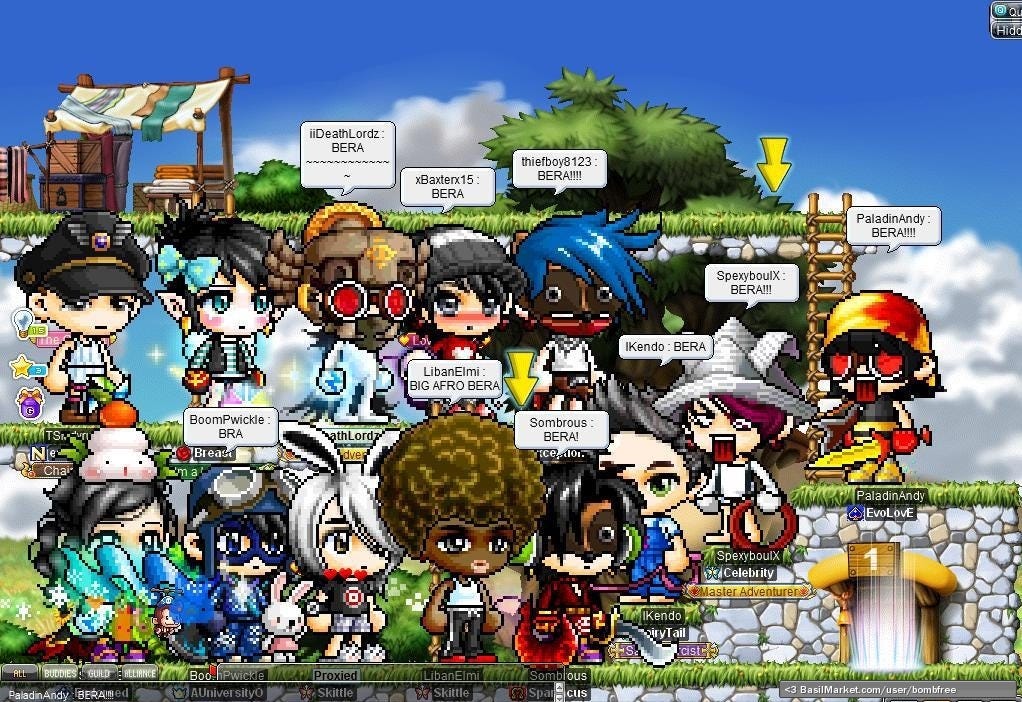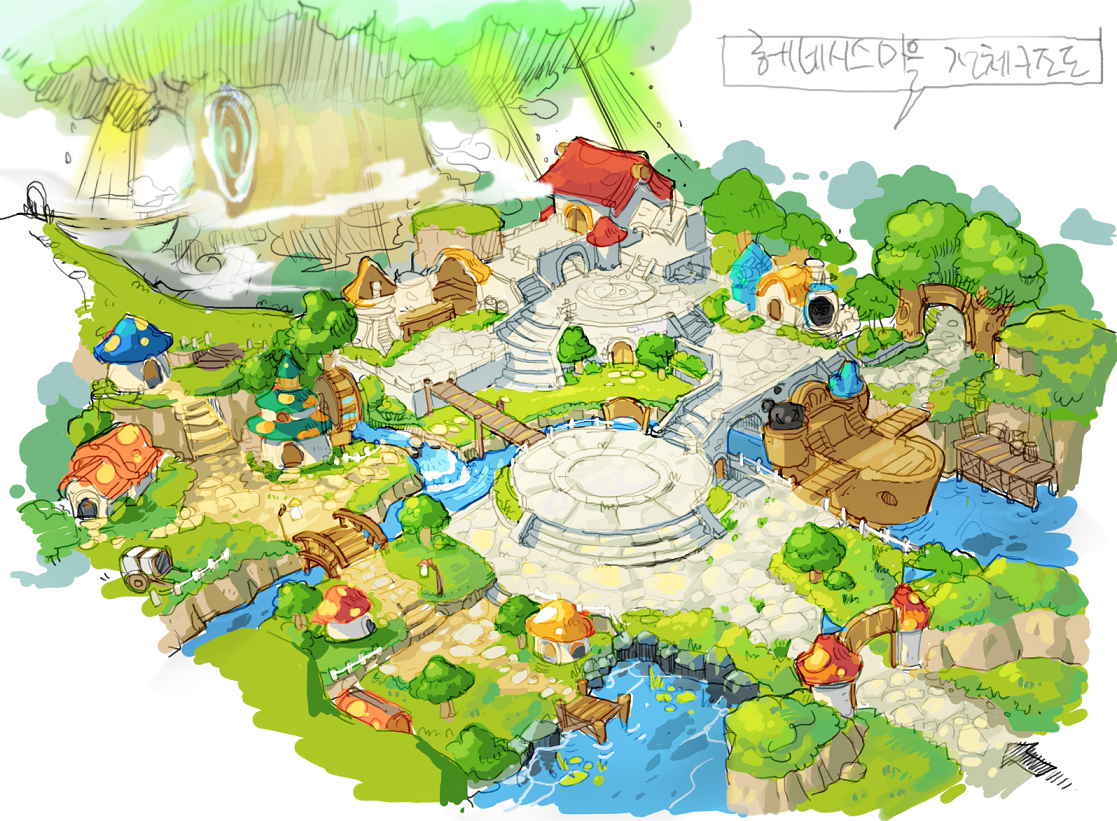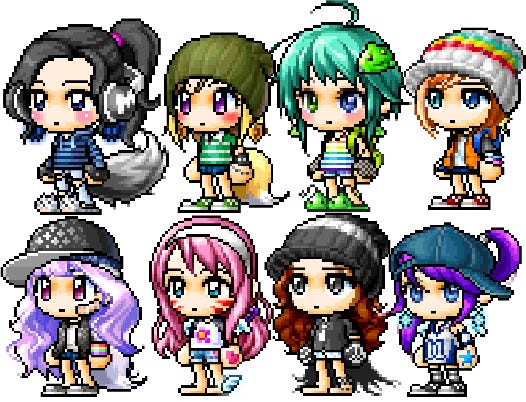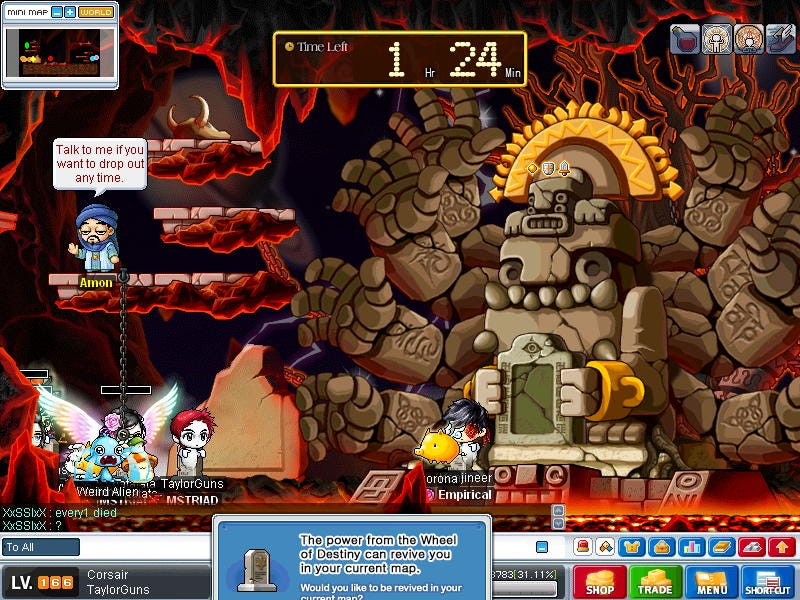maplestory reboot analysis: player psychology & systems design
a digest about the design philosophies that went into nexon's design of maplestory's Reboot server world and its positive consequences for nexon's business in subsequent years


maplers
the mapler in me still furrows its chibi brows in curiosity when new releases roll around the corner.
back when as a 7th grader, skipping lunch to save up 2.50$ a day for 10$ a week, i’d run two miles each friday to the neighborhood 7-eleven, throw open the door—bells jingling—float down the aisle towards the light, and purchase nx cash.
those days are long gone now, but the pleasantness of the memories remain. maplestory is still around. released years ago back in the turn of the century—2003, this rpg continues to be a marvel 14 years later. in the fast-paced industry of gaming, especially for one that was developed pre-mobile era and in the east (korea), maplestory continues to be a standout today— ranking #9 as both the highest grossing mmo and highest grossing pc game in the world.
it’s partly the result of elegantly-designed game systems that brought it to stardom and eminence as a role-playing game. the reboot server especially, deserves credit for maplestory’s continued fervor. diving into what design principles the reboot server systems follow, we can glean what is valued in a successful online rpg game. let’s go!

maplestory ‘henesys’ town concept art
some background information: MS contains a multitude of servers (or worlds) in which players can play. reboot is one such world, stirring renewed interest in years following its inception. reboot has contributed immensely to maplestory’s revenue as nexon’s (NEXOF:OTC) second top game and resulted in their most profitable year ever in 2017.
released in 2015, the reboot world has reignited player interest through several key systems models:
free-to-win: most know f2p games as “free to play, but pay to win.” this monetization model is the epitome of mobile gaming, and all games in the mobile top 500 are essential duplicates of this revenue scheme. people call this the freemium model. don’t mistake console games as mobile games though. console games, such as those on the nintendo switch, cost upwards of $60—as is the case for the switch’s most popular game zelda: breath of the wild. however, in the reboot server, all valuable enchanting items (usable items that empower your weapons and armour) can be obtained without micro-transactions. they’re free for they are farmable—u can obtain them through bossing or simply grinding (which is camping in the same map and killing monsters over and over until u get the drop). if you’re not happy with your current stats, wait til tomorrow to raid a boss or go grind to find the drops that will give you that power bump.
and how does nexon profit with this model? simple. by charging for customizing how your character looks. whether it’s buying that cute winter beanie or those snapchat-looking summer shades, options are limitless in giving players the power to choose their physical destiny. they can literally be whatever they want—having blue or purple hair, wear bunny slippers while killing the final boss…u decide the rules. in player psychology, giving them the freedom to choose precisely how they want to look and identify themselves…that is more empowering than in real life, where you can’t pick and choose the hue of your eyes or how fair or tan your complexion is. in real life, players can’t have grey skin and look like a vampire and cant look like edward cullen. enhancements like these make the game all the more compelling—making for an addicting experience
…and a profitable one as well.

any style, any choice, every combination at the player’s discretion
one high-impact design feature: aesthetics have no consequence on core game progression systems and does not open power gaps between the paying and nonpaying player base. in other words they dont make the player stronger, just prettier. power inequality (and its consequences) is akin to the income inequity in the US economic system. when there are stark differences in power levels and wealth between paying players and nonpaying players, there results in consequences like community toxicity and sweeping assumptions that the developers are money-grubbing. therefore, reducing brand favor-ability and catalyzing player flight. in league of legends, we see clearly the consequences of a bad community. toxic interactions turn casual players off and result in a diminishing casual player base, leaving primarily the hardcore fanatics. when that happens, new players and existing casual players alike are very likely to have more negative experiences from their gaming experiences since there are less remaining casuals and thus more toxic hardcore players, further causing upheaval—feeding a positive feedback loop that reduces player retention and causes the community to contract.
nexon avoids potential power gaps by implementing paid features that have no effect on a player’s core potential to advance in the game, which in an rpg is a player’s ability to kill stronger monsters and bosses. nx cash items (the premium fashion items) and other cosmetic features don’t heighten your ability to boss zakum or horntail; you simply look more stylish doing it.

zakum and defeated players
paced progression: many games struggle with this concept. developers invest years to craft fantastical worlds for players to immerse themselves in, but often overlook a critical element that contributes to an elegant system—paced progression. in the rpg scene, it’s important devs not allow players to become strong too quickly and clear their end-game content and lose interest before a robust community ecosystem emerges (when a community emerges, the game’s stickiness goes up several levels). analogously, in open world games (in which players explore vast terrains), it’s critical the devs set up barriers-to-entry so users won’t be able to explore the entirety of the world environment in one (binged) go. the games that succeed in finely tuning progression rise up the ranks to eminence. in reboot, there is no trade/transfer system. if you find green eggs on one character and you find green ham in another, you can’t transfer one item to the other to complete the ‘green eggs and ham’ set. this system feature, while outwardly appearing tedious, is crucial in preventing players from becoming too strong too fast. trade implies the notions of comparative advantage (games have economies too), thereby causing a good to trade to the user that will have the greatest utility for it—maximizing efficiency and gain for exchanging parties. trade in a massive-multiplayer online game (mmo) would be a means to insanely fast progression for participants, magnifying growth to an unsustainable level for the longevity of the game. maplestory reboot avoids that by barring players from trading with each other entirely, moreover, you can’t share equipment you find on one character and share it with another in your account. this forces players to advance more moderately as well as forcing them to face more challenges (due to a lack of shortcuts) to become strong. games that consistently challenge players in a game are psychologically more rewarding. with a greater challenge and a greater reward comes a more meaningful experience, one that will keep players immersed longer.
one added benefit of the ‘no trade policy’ is that hackers and botters effectively have little effect on core game systems and the economy. botters set up programs to kill monsters and farm gold and drops, even while they are asleep. this results in an inequity since they can make gold 24/7, giving them access to greater riches. since there is no economy, hackers won’t be able to sell and distribute their surpluses and wont be able to affect other players’ experiences through impacting the values of their goods, among other consequences.

chu chu island environment
breadth of meaningful immersion: the gods of mmorpgs have a level of immersion unparalleled to others. there is so much discovery you can do as well as having much more to master. this gives players many opportunities of immersion and fun—keeping them cooking, building, collecting, and training. maplers in reboot have the added access to mix potions, forge weapons and armors, forage for herbs and mine minerals all at the same time. worlds besides the reboot world only allow for the user to engage in one of the above 3 endeavors— limiting breadth of experience by 66% in this aspect alone. immersion is an important quality to keep players engaged. reboot does this well by extending the cap of the breadth of experiences above and beyond past developments to give users not just an apple or a pear, but the entire fruit basket to enjoy.
beyond reboot-specific mechanics, maplers can duke it out against other players, and even marry. this is equivalent to the pizza worker at one restaurant who works on just knitting the dough versus another who has the freedom to participate in all tasks: knead the dough, slice the pepperonis, fritter the veggies, slather the tomato sauce, drizzle the olive oil…season and bake. yum. the worker who can immerse himself in all these elements of work enjoys a fulfilling experience and will leave at the end of the day satisfied. it is this same psychological meaning that applies to game product design. having a variety of meaningful tasks that each have their own unique feel contributes to a worthwhile experience. for a pizza worker, tossing the dough vs. rolling the dough are immaculately different, yet provide the breadth and depth to make for a much more engaging time. these are some of the wide array of game systems that constitute the maple ecosystem.
End-game: looking broadly over the systems and their underlying design principles, we gleaned some of the ingredients needed to cook up a really good pizza. the concepts of free-to-play, paced progression, and breadth of meaningful immersion are the design end-goals we want to know and apply from the beginning to the end. there is so much to be said, but these three are timeless principles that can be applied and used beyond just maple.

a maple couple
Read more about:
BlogsAbout the Author(s)
You May Also Like









